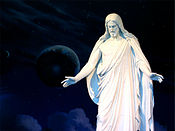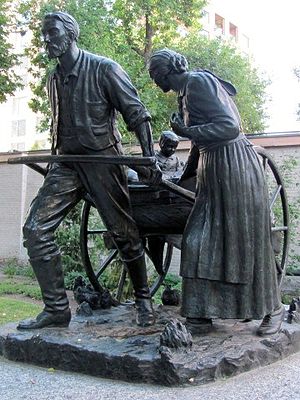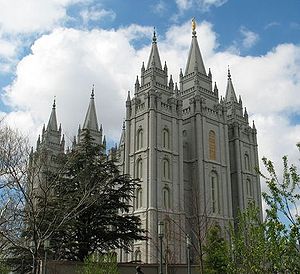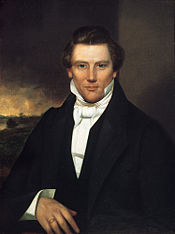- Portal:Latter-day Saints
-
- Wikipedia portals:
- Culture
- Geography
- Health
- History
- Mathematics
- Natural sciences
- People
- Philosophy
- Religion
- Society
- Technology
 Religion: Adventism · Ahmadiyya · Anabaptism ·
Religion: Adventism · Ahmadiyya · Anabaptism ·  Anglicanism · Arminianism · Ayyavazhi · Bahá'í Faith · Baptist · Bible · Book of Mormon ·
Anglicanism · Arminianism · Ayyavazhi · Bahá'í Faith · Baptist · Bible · Book of Mormon ·  Buddhism · Calvinism · Christadelphians ·
Buddhism · Calvinism · Christadelphians ·  Christianity · Christianity in China · Christianity in India · Confucianism · Creationism · Eastern Christianity · Falun Gong · Greek mythology · Heathenism ·
Christianity · Christianity in China · Christianity in India · Confucianism · Creationism · Eastern Christianity · Falun Gong · Greek mythology · Heathenism ·  Hinduism · Hindu Mythology ·
Hinduism · Hindu Mythology ·  Islam · Jainism · Judaism · Kabbalah · Latter‑day Saints · Lutheranism · Mahayana Buddhism · Methodism · Mythology · Nontheism · Occult · Oriental Orthodoxy · Pope · Roman Catholicism · Saints ·
Islam · Jainism · Judaism · Kabbalah · Latter‑day Saints · Lutheranism · Mahayana Buddhism · Methodism · Mythology · Nontheism · Occult · Oriental Orthodoxy · Pope · Roman Catholicism · Saints ·  Scientology · Shinto · Sikhism · Spirituality · Sufism · Syriac Christianity · Taoism · Tibetan Buddhism · Vajrayana Buddhism · Wicca · Zoroastrianism
Scientology · Shinto · Sikhism · Spirituality · Sufism · Syriac Christianity · Taoism · Tibetan Buddhism · Vajrayana Buddhism · Wicca · ZoroastrianismThe Latter-day Saints Portal
 Stained glass depiction of the First Vision of Joseph Smith, Jr., completed in 1913 by an unknown artist (Church History Museum).
Stained glass depiction of the First Vision of Joseph Smith, Jr., completed in 1913 by an unknown artist (Church History Museum).
The Church of Jesus Christ of Latter-day Saints, sometimes referred to as the LDS Church or the Mormon Church, describes itself as the restoration of the original church established by Jesus Christ. It is classified as a Christian church; separate from the Catholic or Protestant traditions, though many of those denominations disavow the LDS Church.
The Church teaches that God the Father and Jesus Christ appeared to Joseph Smith, Jr., called him to be a prophet and to restore the original church as established by Jesus Christ during his mortal ministry. This restoration is often referred to by members of the Church as the Fulness of the Gospel of Jesus Christ, which they believe was had by prophets and righteous civilizations throughout the earlier history of the earth. The restoration included all elements that had been missing from Christianity since the early days of Christianity due to apostasy. This restoration included the return of priesthood authority, new sacred texts, and the continual calling of a prophet and twelve apostles. The Church was organized under the leadership of Joseph Smith in Fayette, New York, on April 6, 1830, soon after Smith's translation of the Book of Mormon from which adherents—also called Latter-day Saints—get their nickname Mormons.
Joseph Smith led the Church until he was martyred in 1844. After a period of confusion during which the Church was led by the Quorum of the Twelve Apostles and various claims of succession were made, Brigham Young led a group of Mormon pioneers away from the former church headquarters in Nauvoo, Illinois, and then eventually to the Salt Lake Valley of Utah in July 1847. Brigham Young was sustained as President of the Church at General Conference in December 1847.
Now a more international organization, the Church has its world headquarters in Salt Lake City, Utah where Thomas S. Monson serves as its sixteenth President. The Church sends tens of thousands of missionaries throughout the world yearly, with over 53,000 currently in service. As of December 31, 2008, the Church reported a worldwide membership of 13,508,509, with more than 50% living outside the United States.
Selected article
 Latter-day Saints believe in the resurrected Jesus Christ, as depicted in the Christus Statue in the North Visitors' Center on Temple Square in Salt Lake City
Latter-day Saints believe in the resurrected Jesus Christ, as depicted in the Christus Statue in the North Visitors' Center on Temple Square in Salt Lake City
In the Church of Jesus Christ of Latter-day Saints, God means Elohim (the Father), whereas Godhead means a council of three distinct gods: Elohim, Jehovah (the Son, or Jesus), and the Holy Spirit. The Father and Son are considered to have perfected, material bodies, while the Holy Spirit has a body of spirit. This conception differs from the traditional Christian Trinity; in Mormonism, the three persons are considered to be fully separate beings, or personages, but united in will and purpose. As such, the term Godhead has a different meaning than the term as used in traditional Christianity. See Godhead (Christianity).
This predominant formulation of God represents the orthodoxy of The Church of Jesus Christ of Latter-day Saints (LDS Church), established early in the 19th century. However, the Mormon conception of God has evolved since the faith's founding in the late 1820s. Originally, the faith had an essentially trinitarian conception of God, which evolved by the death of founder Joseph Smith, Jr. into a henotheism implying a vast hierarchy of gods into which humans have a place if they progress to achieve a high state of perfection and glory.
Being nontrinitarian, the orthodoxy of modern and fundamentalist Mormonism is a departure from traditional Christian theology as established, for example, in the First Council of Constantinople. Mormon theology is part of a broader cosmology that teaches the existence of other gods, such as the resurrected and exalted Abraham; these entities are not, however, the object of adoration. Mormons also teach the existence of a Heavenly Mother as the literal mother of human spirit; again, her worship is strongly discouraged.
Selected picture
The LDS Conference Center (located in Salt Lake City, Utah, and erected in 2000) is home of General Conference , a bi-annual world conference of The Church of Jesus Christ of Latter-day Saints held in April and October, where members gather for five two-hour sessions to listen to instruction from Church leaders. It also houses devotionals, concerts, and plays.
Did you know...
...that, according to Mormonism, the Book of Mormon is another Testament of Jesus Christ?
...that Joseph Smith: The Prophet of the Restoration is a 2005 film that focuses on some of the events during the life of Joseph Smith, Jr.?
...that additional Latter-day Saints scriptures are the Holy Bible (both Old and New Testament), Doctrine & Covenants and, according to Mormonism, the Pearl of Great Price?
...that on June 23, 2004 (Hinckley's 94th birthday), President George W. Bush awarded Gordon B. Hinckley, President of the Church, the Presidential Medal of Freedom, the highest civilian honor awarded by the United States, in a ceremony at the White House?
...that the pioneers traveled to the Salt Lake Valley in the Great Basin using wagons, handcarts, and, in some cases, personally carrying their belongings. Their trail along the Platte River and over the Sweetwater River became known as the Mormon Trail?
...that Richard Nibley was one of the original members of the Mormon Miracle Pageant orchestra?
Selected history
The Mormon handcart pioneers were participants in the westward migration of members of The Church of Jesus Christ of Latter-day Saints who used handcarts to transport their supplies and belongings while walking from Iowa or Nebraska to Utah. The Mormon handcart movement began in 1856 and lasted until 1860.
Motivated to join their fellow Church members in avoiding persecution but lacking funds for full ox or horse teams, nearly 3,000 Mormon pioneers from England, Wales, and Scandinavia made the journey to Utah in 10 handcart companies. For two of them, the Willie and Martin handcart companies, the trek led to disaster after they started their journey dangerously late and were caught by heavy snow and bitterly cold temperatures in the Rocky Mountains of central Wyoming. Despite a dramatic rescue effort, more than 210 of the 980 pioneers in the two companies died along the way. "Many a father pulled his cart, with his little children on it, until the day preceding his death."
Although fewer than ten percent of the 1847–68 Latter-day Saint emigrants made the journey west using handcarts, the handcart pioneers have become an important symbol in LDS culture, representing the faithfulness, courage, determination, and sacrifice of the pioneer generation. The handcart treks were a familiar theme in 19th century Mormon folk music and handcart pioneers continue to be recognized and honored in events such as Pioneer Day, Church pageants, and similar commemorations.
Selected Location
The Salt Lake Temple is the sixth completed (of more than 120) and best-known temple of The Church of Jesus Christ of Latter-day Saints. It is the sixth temple built by the church overall, and the fourth operating temple built since the Mormon exodus from Nauvoo, Illinois.
Located in Salt Lake City, Utah, the location for the temple was first marked by Brigham Young, the church's president and prophet at the time, on July 28, 1847, just four days after arriving in the Salt Lake Valley. The temple site was dedicated on February 14, 1853. Groundbreaking ceremonies were presided by Brigham Young, who laid the cornerstone; construction officially began on April 6 of that year. Oxen transported granite from Little Cottonwood Canyon twenty miles southeast of the temple site. When construction was finally completed, LDS President Wilford Woodruff dedicated the temple on April 6, 1893, after exactly forty years.
The Salt Lake Temple is the centerpiece of the 10 acre (40,000 m²) Temple Square in Salt Lake City, Utah. Although there are no public tours inside the temple (because it is considered sacred by the church and its members, a temple recommend is required), the temple grounds are open to the public and are a popular tourist attraction. Due to its location at church headquarters and its historical significance, it is patronized much by Latter-day Saints from many parts of the world.
Selected biography
Joseph Smith, Jr. (December 23, 1805 – June 27, 1844) was an American religious leader who restored the Latter Day Saint movement, a restorationist ideology that gave rise to Mormonism.
Smith's followers revere him as the first latter-day prophet, the "Prophet of the Restoration", called by God to restore the fullness of the Gospel of Jesus Christ. This restoration included announcement that God had directly communicated with man; the introduction of another testament of Jesus Christ (the Book of Mormon); the return of priesthood authority to act in the name of God; the building of temples; and the restoration of the Kingdom of God on earth (Zion). Smith was (and remains) a very controversial figure; his teachings were known to inspire deep devotion in his followers, yet deep, personal hostility and even hatred from his detractors. Smith was also a political and military leader of the American West.
Smith taught a form of Christian restorationist doctrines, such as the idea that Christianity had been in a state of apostasy, which could be restored by modern prophecy and revelation from God. In other cases, the doctrines were unique to Mormonism.
Quotes
THIRD NEPHI
THE BOOK OF NEPHI
THE SON OF NEPHI, WHO WAS THE SON OF HELAMANJesus Christ did show himself unto the people of Nephi, as the multitude were gathered together in the land Bountiful, and did minister unto them; and on this wise did he show himself unto them. Comprising chapters 11 to 26 inclusive.
CHAPTER 11 The Father testifies of his Beloved Son—Christ appears and proclaims his atonement—The people feel the wound marks in his hands and feet and side—They cry Hosanna—He sets forth the mode and manner of baptism—The spirit of contention is of the devil—Christ’s doctrine is that men should believe and be baptized and receive the Holy Ghost. [A.D. 34]
1 And now it came to pass that there were a great multitude gathered together, of the people of Nephi, round about the temple which was in the land Bountiful; and they were marveling and wondering one with another, and were showing one to another the great and marvelous change which had taken place.
2 And they were also conversing about this Jesus Christ, of whom the sign had been given concerning his death.
3 And it came to pass that while they were thus conversing one with another, they heard a voice as if it came out of heaven; and they cast their eyes round about, for they understood not the voice which they heard; and it was not a harsh voice, neither was it a loud voice; nevertheless, and notwithstanding it being a small voice it did pierce them that did hear to the center, insomuch that there was no part of their frame that it did not cause to quake; yea, it did pierce them to the very soul, and did cause their hearts to burn.
4 And it came to pass that again they heard the voice, and they understood it not.
5 And again the third time they did hear the voice, and did open their ears to hear it; and their eyes were towards the sound thereof; and they did look steadfastly towards heaven, from whence the sound came.
6 And behold, the third time they did understand the voice which they heard; and it said unto them:
7 Behold my Beloved Son, in whom I am well pleased, in whom I have glorified my name—hear ye him.
8 And it came to pass, as they understood they cast their eyes up again towards heaven; and behold, they saw a Man descending out of heaven; and he was clothed in a white robe; and he came down and stood in the midst of them; and the eyes of the whole multitude were turned upon him, and they durst not open their mouths, even one to another, and wist not what it meant, for they thought it was an angel that had appeared unto them.
9 And it came to pass that he stretched forth his hand and spake unto the people, saying:
10 Behold, I am Jesus Christ, whom the prophets testified shall come into the world.
Categories
- Latter Day Saint denominations
- Latter Day Saint organizations
- Latter Day Saint doctrines, beliefs, and practices
- Latter Day Saint doctrines regarding deity
- Latter Day Saint ordinances, rituals, and symbolism
- Latter Day Saint hierarchy
- Latter Day Saint texts
- Temples of The Church of Jesus Christ of Latter-day Saints
- Book of Mormon
- Book of Mormon artifacts
- Book of Mormon people
- Book of Mormon places
- Book of Mormon prophets
- Book of Mormon studies
- Books of the Book of Mormon
- Latter Day Saint periodicals
- History of the Latter Day Saint movement
- Significant places in Mormonism
- Latter Day Saints
- Historians of the Latter Day Saint movement
- Mormon pioneers
- Latter Day Saint leaders
- Presidents of the Church of Jesus Christ of Latter-day Saints
- Latter Day Saint art and culture
- Portrayals of Mormons in popular media
- Latter Day Saint music
- Latter Day Saint films
- Genealogy
Related portals
Religion Christianity Book of Mormon Saints Bible Latter-day Saints topics
History of the Latter Day Saint movement: Extermination Order (Mormonism) - Mormon handcart pioneers - Mormon Battalion - Succession crisis (Mormonism) - Mormon Reformation - Mountain Meadow Massacre
Major Beliefs: Godhead - Jesus Christ · Gift of the Holy Ghost - Articles of Faith (Mormonism) - Temple (Mormonism)
Standard Works: Old Testament - New Testament - Book of Mormon - Doctrine and Covenants - Pearl of Great Price
Latter Day Saint denominations: The Church of Jesus Christ of Latter-day Saints - Community of Christ - Fundamentalist Church of Jesus Christ of Latter Day Saints - Bickertonite - Strangite - Hedrickite
Criticism and analysis: Criticism of the LDS movement - Criticism of the Church of Jesus Christ of Latter-day Saints - Origin of the Book of Mormon - Archaeology and the Book of Mormon - Prophecies of Joseph Smith, Jr. - Mormonism and polygamy - Mormon studiesThings you can do
- Suggest new feature articles and pictures.
- Contribute to the wikiprojects
- Upload pictures for and contribute to the Book of Mormon categories
WikiProjects
Categories:- Latter-day Saints portal
- Christianity portals
- Culture portals
- Society portals
Wikimedia Foundation. 2010.







